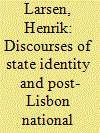| Srl | Item |
| 1 |
ID:
136697


|
|
|
|
|
| Summary/Abstract |
The disparities in per-capita wealth and national productivity that divide the United States and Latin America today have often been understood as results of institutional variations introduced during each region's period of imperial rule. According to this interpretation, path-dependent processes preserved institutions installed by Britain, Spain, and Portugal across the centuries, propagating their positive or negative economic effects, and eventually producing a marked “development gap” in the hemisphere. This article aims to improve this account by highlighting the direct and indirect economic effects of the success or failure of the political unions established after independence in both the United States and Latin America. It demonstrates that influential political theorists throughout the hemisphere understood the developmental advantages to be gained from unifying former colonies and employing the political authority newly at their disposal to abolish the stifling institutional legacies of European rule, suggesting that if Spanish America's unions had endured, or conversely, if the United States had collapsed, the two regions' economies might not have diverged as dramatically as they subsequently did. This illustrates an important contribution that the emerging subfield of “comparative political theory” can make to comparative political science in general, and to the new institutionalism in particular, by providing uniquely direct insight into the choices available to political actors in consequential moments of institutional genesis and change, and revealing the contingency of institutional variations that might otherwise appear inevitable.
|
|
|
|
|
|
|
|
|
|
|
|
|
|
|
|
| 2 |
ID:
134256


|
|
|
|
|
| Summary/Abstract |
The political system of the EU and its member states is frequently seen as post-Westphalian within constructivist-inspired research. This is based on the view that political authority and legitimacy are to be found both at the EU level and the national level with no clear borders between them. The question raised in this article is how the member states conceive of themselves as foreign policy actors in this situation where they are both politically embedded in EU foreign policy structures and, in most cases, formally able to act outside the EU structures in the field of foreign policy. The overall argument is that a pertinent answer to this question can be provided by looking at how (or whether) state identity is articulated in relation to the EU. The paper first presents theoretical considerations relating to discursive articulations of state identity in an EU context. The relevance of these discursive articulations is then illustrated through the empirical example of Danish articulations of actorness prior to and post Lisbon. It is shown that the articulation of national actorness in relation to the EU varied across the different areas of foreign policy before and after Lisbon. A research agenda that flows from these considerations is outlined.
|
|
|
|
|
|
|
|
|
|
|
|
|
|
|
|
| 3 |
ID:
135863


|
|
|
|
|
| Summary/Abstract |
Most residents of Baku, Azerbaijan, retain a positive view of the state restructuring of the gas distribution network and do not object to the principle of paying for gas at its ‘market price’. They are, however, very critical of the street-level officials (gazoviki) of the state-owned gas company, who often defraud residents in elaborate schemes. This article highlights the neighbourhood-level impacts of broad technological changes in the domestic gas distribution system, arguing that they have permitted new forms of exploitation by gazoviki. By examining the terms in which citizens have responded to such scams, it is possible to relate these commentaries to locally prevailing and culturally patterned understandings of moral economy and governance. Popular critiques both of malfeasance in the gas network and of wealth accumulation as a result of Azerbaijan's hydrocarbon boom are discursive attempts to restore a moral order that citizens increasingly worry has been abandoned.
|
|
|
|
|
|
|
|
|
|
|
|
|
|
|
|